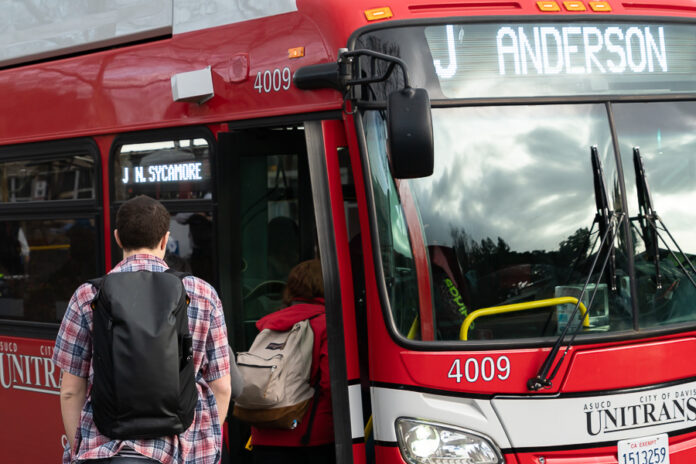Celebrating 51st anniversary, Unitrans continues to prioritize student safety
After celebrating its 51st anniversary and the success of a student fee initiative, Unitrans is also emphasizing its Safe Space Initiative, something the ASUCD transportation unit’s managers and employees are proudly implementing and promoting.
Unitrans, which provides transportation around the City of Davis to over 20,000 passengers daily, implemented the initiative after an incident a few years back in which a Unitrans passenger was harassed on the bus.
“In response to that, we wanted to make sure all of our riders should never have an expectation that something like that would ever occur to them moving forward,” said Jeff Flynn, the general manager at Unitrans. “We pushed the initiative to let everybody know that Unitrans is safe, and we have a no-tolerance policy with these types of issues. If you need help, we will get it to you.”
The initiative has one goal in mind: to keep all passengers safe.
“The Safe Space Initiative is being sure that as a community and as bus drivers we are ensuring the comfort and safety of our passengers,” said Leah Guerrero, the transit driver manager for Unitrans. “That’s really big to us, as bus drivers, as well as everyone in the company.”
All Unitrans drivers and employees are expected to uphold certain standards as part of the initiative. All drivers go through a lengthy, intensive driver-training program, which requires over 100 hours of training. During this process, employees learn “how to identify safety and security issues and how to respond to them,” Flynn said.
“If there is a problem on the vehicle, you call dispatch,” Flynn said. “If it’s imminent where you can’t call dispatch, you pull over the vehicle, you stop it, you open the doors to allow any threat to get out and call the police immediately.”
Weston Snyder, the operations manager for Unitrans, also spoke about how the training prepares the drivers to deal with safety issues.
“They emphasize the drivers are never alone in the situation — they always have someone to go to,” Snyder said, adding that there is a high level of communication between supervisors and drivers. Supervisors provide aid in any given situation.
Nevertheless, there are still limits to what drivers can do in certain situations. They are there to alleviate any issues that may come up on the bus, but the safety of both the passengers and the drivers is always the number one priority.
“By stopping the threat, we don’t want the drivers to interfere — they are not there to intervene; they are there to call for help immediately,” Flynn said. “The drivers are not trained to engage a threat. The driver’s priorities are the customers safety and their safety, they are not to put themselves in a situation that will endanger themselves.”
Flynn added that the response times by law enforcement can be anywhere from 90 seconds to two minutes, giving a nod to the police officials and their efficiency.
Snyder gave a similar response, saying “we really can’t be expected to intervene if something is getting dangerous or violent.”
“The drivers know there is always someone they can call, and they are always able to call the police if something is unsafe,” Snyder said.
Guerrero discussed the flexibility that the drivers have in terms of how they respond to a given situation, specifically mentioning the fires that affected Northern California last year and the shooting of the Davis police officer that occurred earlier this year as examples of where student drivers were still driving and ensuring the safety of all of their passengers during that time.
“A lot of our job is being sensitive and understanding of any passenger on the bus,” Guerrero said.
When asked if he had any expectations for passengers, Snyder mentioned that he would hope that passengers would treat others on the bus with respect. This includes the driver and what the driver asks of the passengers in any given situation.
“The driver is there to make sure that the environment is healthy and safe for everybody,” Snyder said.
Flynn acknowledged that this year has been a tough one for Unitrans. After a successful fee initiative and the recent celebration of the unit’s 51st anniversary, however, Flynn remained optimistic about the future.
“We are making sure that we invest your dollars wisely and we understand how sensitive finances are,” Flynn said. “We want to prove our value and continue to increase our values to the undergraduate community.”
Written by: Alexis Lopez-Perez — campus@theaggie.org










The term “safe space” is routinely mocked by anyone to the right of Chairman Mao. It would be nice if the people making such initiatives did not exist inside such a dense bubble.